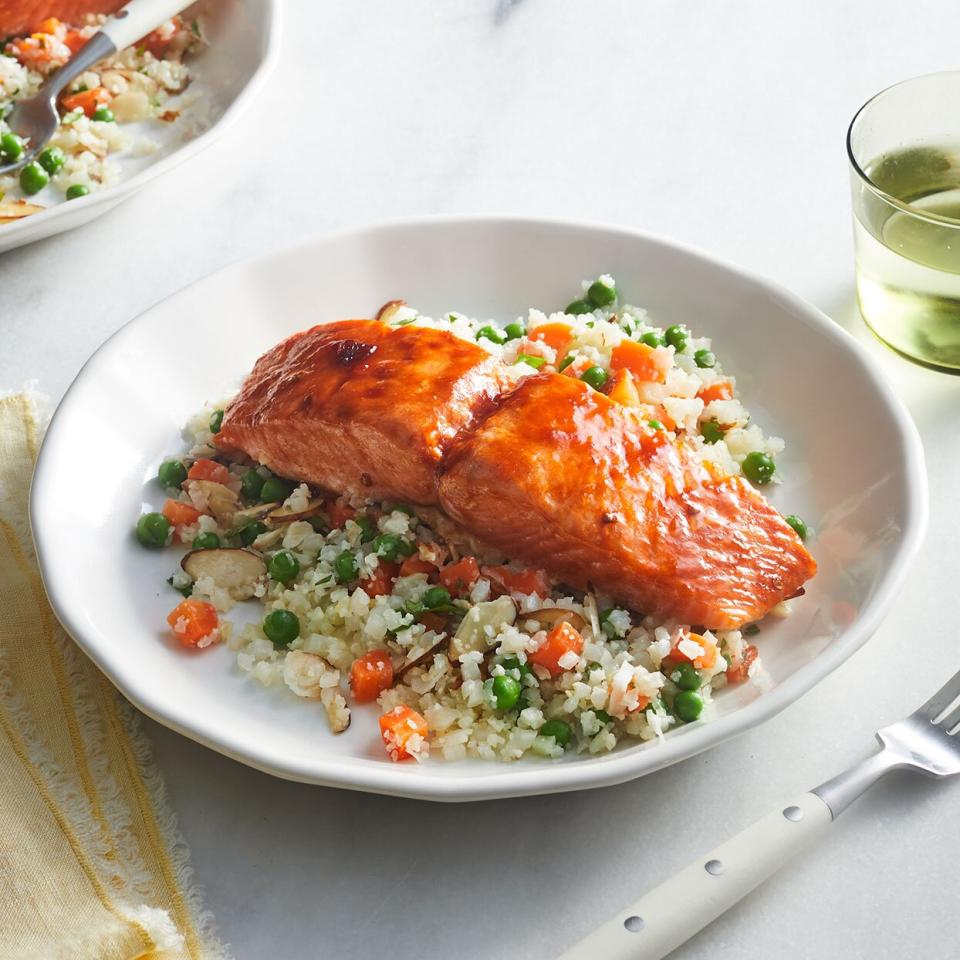What Is the Galveston Diet? Pros & Cons, Plus What You Can Eat
TABLE OF CONTENTS
On This Page
What Is the Galveston Diet?
What Can You Eat?
Is the Galveston Diet Good for You?
Pros
Cons
The Bottom Line
Hormonal changes around the time of menopause, combined with aging and lifestyle factors, can lead to frustrating weight gain for many women. Dr. Mary Claire Haver, MD, an obstetrician-gynecologist, found this true for herself and her many patients who could no longer get the scale to budge with the common advice to "eat less and move more." (Here are 10 eating changes to make once you turn 50.) As a result, Haver developed the Galveston Diet to help middle-aged women burn fat and combat menopausal weight gain. Keep reading to learn what foods you can and cannot eat, if it's good for you, and the pros and cons of this diet plan.

Jennifer Causey
What Is the Galveston Diet?
The Galveston Diet is a self-paced weight loss program designed to reverse menopausal weight gain through a combination of anti-inflammatory foods and intermittent fasting. Focusing on anti-inflammatory foods, instead of just restricting calories, helps hormones work in our favor for fat loss, says Haver. The diet emphasizes whole foods and limits processed foods, added sugars and artificial ingredients. There are three different levels of the self-paced course to choose from, ranging from $59 to $199. The fee gives you access to the curriculum, meal plans, recipes and helpful tools. There are trainings on hormones, fasting and inflammation, as well as seven weeks of meal plans and shopping guides.
What Can You Eat?
The Galveston Diet prioritizes anti-inflammatory whole foods, including lean proteins, fruits, vegetables, legumes, whole grains, healthy fats, and full-fat dairy. (The Salmon with Roasted Red Pepper Quinoa Salad, pictured above, would be a good dinner choice.) Processed foods with added sugar, artificial ingredients, colors, flavors, and high fructose corn syrup are discouraged, along with processed meats containing nitrates/nitrites, fried foods, inflammatory oils like canola or vegetable oil and refined flours and grains, as these have been shown to cause inflammation in the body.
However, when you eat is just as important as what you eat on this diet. Intermittent fasting is a non-negotiable on the Galveston Diet. Haver says that intermittent fasting leads to weight loss because of a calorie restriction, but she also explains that any calorie restriction will lead to weight loss. Research backs this, as studies show that intermittent fasting does not lead to more weight loss than simply a calorie restriction overall.
However, Haver emphasizes the neuroprotective, anti-inflammatory effects of intermittent fasting as reasons for including it on the Galveston Diet. The 16:8 method is recommended—fasting for 16 hours and eating in an 8-hour window. While the 5:2 method (eating 500 calories for two days per week and maintenance calorie needs for the other days) may lead to similar results, she argues the 16:8 is easier for most people to incorporate into their lives.
Is the Galveston Diet Good for You?
There's no current research specifically on the Galveston Diet, but its emphasis on nutritious whole foods and minimization of processed foods and sweets is the foundation of any healthy diet. Research suggests a link between inflammation and obesity, so increasing intake of nutritious, anti-inflammatory foods like fruits, vegetables, and omega-3 rich fatty fish, nuts and seeds and decreasing consumption of inflammatory processed foods and sugar is beneficial for overall health and weight.
In addition, intermittent fasting can be an effective weight loss tool, but more robust, long-term research is needed to understand its safety and efficacy. Plus, intermittent fasting isn't for everyone, including individuals with diabetes, those taking certain medications, or people with a history of eating disorders. And, as mentioned, when it comes to weight loss, there isn't research to support that intermittent fasting leads to any more weight loss than a calorie deficit overall.
Pros
For one, you don't have to count calories or macros, which makes this diet more sustainable than most. There are macro recommendations inside the program, but instead of focusing on eating less, the Galveston Diet focuses on adding anti-inflammatory foods to your diet, like colorful, antioxidant-rich fruits and vegetables, lean protein, fatty fish, whole grains, nuts and seeds. It also encourages healthy habits like meal planning and prepping and teaches you how to balance your hormones for fat loss.
Cons
There is no research to date on the Galveston Diet or how many people succeed at losing weight and keeping it off on this diet. However, there is research to support eating anti-inflammatory foods. Another downside, as previously mentioned, is that intermittent fasting may not be suitable for everyone. Restricting eating to an eight hour window may backfire for some. Finally, you have to purchase the program in order to have full access to the diet, which may be a limitation for some.
The Bottom Line
There isn't a magical way to eat for your hormones but some foods may help your hormones balanced and your body functioning properly. If you're looking to reverse menopausal weight gain, the Galveston Diet may help you shed some pounds by combining a whole foods diet with intermittent fasting. That being said, research specifically on the Galveston Diet is lacking and it won't be a magic bullet for weight loss.
Before giving this diet a try, you may also want to read upon what intermitting fasting is and what are the benefits and drawbacks for women. If you don't want to purchase the Galveston diet, you can likely get similar benefits from following a diet that emphasizes on anti-inflammatory foods, lean proteins and fiber-rich plant foods over processed foods and sweets.
Whether you decide to pursue this diet or other types of weight loss regimen, you may want to speak with a registered dietitian who can help you identify appropriate weight management strategies and work with you to reach your health goals.

